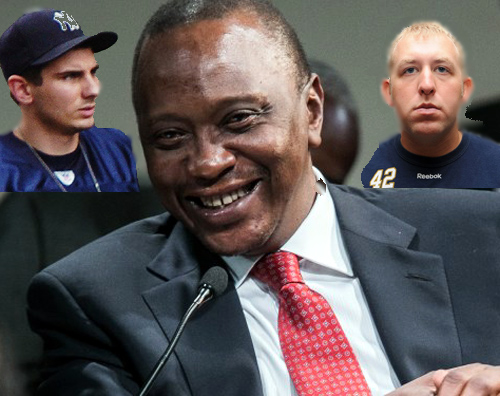 Justice, fairness, equality – “legally” lost today around the world. Uhuru Kenyatta, Darren Wilson and Daniel Pantaleo are today uncharged, and they should not be. What’s wrong?
Justice, fairness, equality – “legally” lost today around the world. Uhuru Kenyatta, Darren Wilson and Daniel Pantaleo are today uncharged, and they should not be. What’s wrong?
Uhuru Kenyatta, the President of Kenya, was indicted for crimes against humanity by the World Court more than a year ago. Today the chief prosecutor dropped all charges.
Darren Wilson and Daniel Pantaleo are white police officers who exceeded their professional protocols while apprehending unarmed black men and killed their victims, but both were released of any charges by local grand juries.
All of this is legal and lawful.
And wrong.
The debating if bickering as to why these major miscarriages of justice occurred will go on for years and ultimately it will be concluded — exactly as it’s understood at this very moment — that modern systems of justice are easily manipulated by those in power.
In Kenyatta’s case, the prosecutor issued a statement blaming the Kenyan government for gross intimidation of witnesses and refusal to cooperate in the search for evidence.
The white police officers were exonerated because of prosecutors’ unusual granular involvements in the deliberations, and law that has become badly interpreted to vindicate virtually anything that a police officer does.
All three men are most likely guilty of the crimes for which they had been considered or in the case of Kenyatta, charged. Without a completed prosecutorial investigation, this certainty will never exist, of course, so we’re forced to speculate if justice was served.
If any of them is truly not guilty, that too will never be known, now. In the public mind it grows more and more impossible that they are innocent.
So justice, whatever it really is, will never exist in these cases.
The only valuable outcome I see is the fact that the world is fast recognizing that these three men are but representatives of a much larger community of possible criminals who escape justice by the manipulation of those in power.
And that power, even in democracies, is apparently absolute.
Many, particularly in Kenya but also here at home, argue that regardless of whether justice was served or not, the outcome is correct.
This is to say that justice is not always the right outcome.
Many, many Kenyans believe that the stability that Kenyatta seems to have achieved among Kenya’s brutally opposed ethnic groups, was worth a couple hundred thousand displaced persons and a thousand deaths.
The argument is that in the absence of Kenyatta’s management of violence following the disputed 2006/7 election that Kenya would have become a failed state mired in unthinkable if barbaric horrors not unlike the situation in Nigeria’s Biafra in the 1960s.
Similarly, Americans believe that police officers can break the law in order to enforce it, provided the overall outcome is a more lawful society.
I disagree. Justice and injustice are mutually exclusive. Manifesting justice does not beget injustice.
There is nothing inherently weakened in the concept of justice if the powerful who find themselves its guardians are themselves punished for injustice. In fact, it strengthens not weakens justice.
No, the explanation is not found in arguments that verge on hyperbole. The explanation is found in the larger masses of society, who are today apathetic or placated if fooled.
There is too little moral indignation than there should be among the societies where these injustices take place, and the powerful recognize this and so take advantage of it.
Justice is not something that was delivered to us by men in wigs 300 years ago, or in the case of Kenya, a convoluted global justice system in its initial stages of infancy.
Justice is there for the taking.
But today not enough people want it.